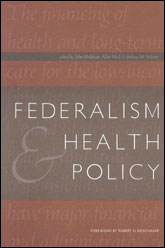
Today, Medicaid and the State Children's Health Insurance Program (SCHIP) finance health care for over 40 million of the nation's poorest and sickest residents-low-income pregnant women, children and parents; those suffering from AIDS and other chronic and disabling conditions; and individuals in need of long-term care. Many of the proposals that seek to extend health insurance coverage for the uninsured in the future call for expanding these programs.
Critical though they are, Medicaid and SCHIP are currently under considerable stress and constitute a shaky base upon which to build a future system. States, which are required to pay a substantial portion of these programs' costs, face serious budget difficulties related to a weak economy, past tax cuts and intense spending pressures. Rising health care costs and enrollment increases related to reductions in work-place coverage have made Medicaid and SCHIP major contributors to the spending pressures states face. This pressure will not lessen appreciably in the future because spending on these programs is projected to grow faster than state revenues, even after the economy rebounds.
Federalism and Health Policy provides a wide-ranging look at the way Medicaid and SCHIP operate today and the roles they might play in the future. It explores the extent of variation in program coverage and spending among states, the modest nature of the coverage initiatives undertaken by the states and the many uninsured that remain, and the important but limited innovations in managed care and long-term care. It also examines the relationship between Medicaid and the state budget crisis and the distrust that has developed between the federal government and the states, which have employed various financial accounting games to increase their federal Medicaid payments.
One theme that runs throughout the book is that the current system is in need of significant reform, particularly if Medicaid and SCHIP are to play a significant role in future efforts to expand coverage for the uninsured. To have any chance of success, such reform proposals must reflect an understanding of the variation in private insurance coverage that now exists across states and the willingness to commit public resources to address coverage gaps. While reforms could take many shapes and forms, to achieve their objectives they, almost certainly, will require a much greater investment of federal dollars and higher national minimum standards of coverage.
—Robert D. Reischauer
Federalism and Health Policy, edited by John Holahan, Alan Weil, and Joshua M. Wiener, is available in paperback from the Urban Institute Press (6" x 9", 446 pages, ISBN 0-87766-716-0, $34.50). Order online or call (202) 261-5687; toll-free 800.537.5487.

